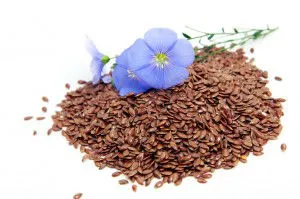If you’re looking to add just one superfood to your diet this summer, flax seeds are a prime contender. These ancient versatile seeds (also known as linseeds) come from flax, a flowering plant with attractive blue flowers, and their nutritional and antioxidant benefits cannot be beat.
The cultivation of flax was first recorded in the Mediterranean region and the Middle East between 4000 and 2000 BC, though some historians say that it could have started as early as 10,000 BC. The seeds were eaten for sustenance, and the fibers were used for various textiles. Both of these uses of flax continue to this day.
One of the best-known benefits of flax seeds is their high concentration of omega-3 fatty acids, mostly in the form of alpha-linoleic acid (ALA). Flax seeds actually contain a higher amount of omega-3’s than any other vegetarian food. These essential fatty acids provide a multitude of benefits to the cardiovascular and nervous systems.
Besides lowering blood triglycerides and boosting cognitive function, omega-3s are linked to improving symptoms of depression and ADHD, and possibly preventing the onset of Alzheimer’s disease and other age-related cognitive impairments. They also have potent anti-inflammatory properties, which can protect against a host of chronic illnesses, and may ease the pain and other inflammatory symptoms of existing conditions, such as arthritis and asthma.
The heart-healthy benefits of flax seeds go beyond lowering triglyceride levels. They have also been found to lower blood pressure levels and reduce belly fat deposits. These little seeds are high in fiber, which is important for cardiovascular function, as well as for keeping blood sugar levels stable and promoting optimal digestion.
One type of fiber found in flax seeds is mucilage, which is a water soluble form of fiber that forms a gel when digested, which improves the ability of the small intestine to absorb many nutrients.
Another primary benefit of these ancient seeds is the presence of lignans. Lignans are polyphenols which pack a triple punch: they are antioxidants, fiber and phytoestrogens in one. The phytoestrogens found in flax seeds bind to estrogen receptors in order to block stronger estrogens from dominating.
This effect has been tied to slowing the growth of some hormonally based cancers, including breast and prostate cancers. These phytoestrogens have also been found to help balance hormones and relieve menopausal symptoms in women.
In a 2005 study performed by researchers at the University of Toronto, muffins with either 25 grams of flax seeds or placebo muffins were given to breast cancer patients on a daily basis for one month. At the end of the month, the researchers observed an increase in “programmed cell death” of breast tumor cells in the women that ate the flax seed muffins versus the placebo.
Aside from these benefits, flax seeds are a great source of protein, and are rich in minerals including calcium, copper, iron, magnesium, manganese, phosphorus, potassium, selenium and zinc. They also contain B-vitamins, vitamin E and vitamin K. These nutrients combine to make flax seeds a very nourishing, well-rounded food which is great for snacking on the go, as well as incorporating into meals.
Flax seeds boast a pleasant, mild, nutty flavor. Some people like to eat them raw by the spoonful. Others grind the seeds and bake them into bread and other baked goods along with their favorite gluten-free flours.

Note: Make sure to grind your flax seeds; an unground seed can go through your digestive system without breaking down the hard outer shell, negating the health benefits of this excellent seed.
With this superfood, the serving options are endless, and the health benefits are vast.
-The Alternative Daily
Sources:
http://www.whfoods.com/genpage.php?tname=foodspice&dbid=81
http://www.webmd.com/healthy-aging/omega-3-fatty-acids-fact-sheet
http://www.biopharmasci.com/file/NanomegaFlaxPrimer-1.pdf
https://www.thealternativedaily.com/phytoestrogens-flaxseed-may-halt-cancer
http://www.ncbi.nlm.nih.gov/pubmed/15897583
